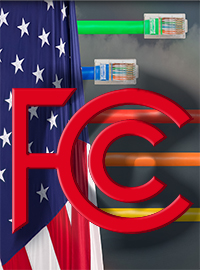| Bank Bailouts 2.0: FCC Should Reject Broadband “Amnesty” Request |
 |
|
By Timothy H. Lee
Thursday, March 28 2024 |
As the Biden administration flounders amid an increasingly grim reelection effort, blame often lies with its insistence on pursuing calamitous policies that are inherently defective, broadly unpopular and disastrous for the economy. In other instances, however, Biden’s problem isn’t a defective underlying policy goal but rather its incompetent execution of otherwise laudable goals that initially claimed bipartisan support. The bipartisan effort to expand broadband access to underserved rural communities offers an illustrative example. For instance, as CFIF and a broad coalition of organizations recently detailed, the Biden administration seeks to impose self-destructive broadband internet price controls as an element of broadband expansion, defying explicit Congressional legislation and even Biden administration officials’ promises to the contrary. Specifically, the Investment and Jobs Act (IIJA) of 2021 achieved a rare bipartisan consensus in pursuit of broadband expansion to Americans without it, but its text as passed specifically stated that price controls were prohibited. Subsequently, Biden administration officials testified under oath before the United States Senate that the infrastructure bill “does not allow” price controls as it attempts to execute the law through its Broadband Equity, Access and Deployment (BEAD) program. Now, however, the administration seeks to do exactly that, and rural Americans without broadband will be the ones to pay the price for its blatant dishonesty. Meanwhile, a group of organizations that wasted billions of taxpayer dollars by failing to perform their obligations under a separate predecessor broadband expansion program entitled the Rural Digital Opportunity Fund (RDOF) seeks to amplify the dysfunction of the BEAD program’s execution. Specifically, as Digital Liberty’s James Erwin has highlighted, that group of underperforming organizations seeks a bailout from Biden’s Federal Communications Commission (FCC), as well as a free pass to repeat their RDOF failures in the even larger BEAD effort: A petition filed with the FCC by a coalition of local governments, government-owned networks, providers, and community development nonprofits asks the commission to grant amnesty to winners of RDOF’s reverse auctions who have not deployed high-speed broadband in rural areas, despite these winners’ failure to fulfill their obligations. This would include both waiving the penalties associated with defaulting on the bids and allowing the awardees to apply for the much larger pot of $42.5 billion available through the Broadband Equity, Access, and Deployment (BEAD) program coordinated by NTIA but run by state governments. They also ask that more USF funds be made available to supplement their RDOF bids. As background, the RDOF program was initially a reverse auction through which “the FCC will direct up to $20.4 billion over ten years to finance up to gigabit speed broadband networks in underserved rural areas, connecting millions of American homes and businesses to digital opportunity.” To date, however, fully $2.8 billion of the $9.2 billion tentatively won in the auction has gone into default. Accordingly, the groups that failed to fulfill their RDOF obligations threaten to expand their performance deficiencies to the BEAD program’s implementation as well. The groups’ petition should be summarily rejected on a number of bases. As an obvious and initial matter, to grant their petition would invite future moral hazard by rewarding failure and perpetuating a cycle of inefficiency in the critical goal of rural broadband deployment. It would violate all concepts of fairness, accountability and prudent use of billions in taxpayer dollars. Holding the failing groups accountable for their performance, in contrast, would send a clear message that noncompliance with broadband expansion program requirements won’t be tolerated, thereby deterring future incompetence or negligence in broadband deployment endeavors. The reinforced prospect of losing out on federal funding and facing substantive repercussions could provide a powerful incentive for awardees to prioritize greater efficiency and compliance with their regulatory obligations. Additionally, by prioritizing compliant groups with more proven track records of success over failing awardees, the FCC could optimize the utility of allocated taxpayer dollars by ensuring that they’re channeled toward projects and performers that deliver tangible results. Congress’s intent with both the RDOF and BEAD programs is to bridge the digital divide and empower rural America with access to high-speed internet. The success of both programs, however, hinges on the FCC’s ability to uphold accountability and integrity in allocating funds. By holding the petitioning groups accountable for fulfilling their obligations and withholding funds from those that fail to do so, the FCC can safeguard the credibility and effectiveness of the RDOF while advancing the goal of universal broadband access for all Americans. Ultimately, the rural Americans currently lacking access to high-speed broadband would benefit from a more sober approach by the FCC. Rewarding past incompetence and inviting future failure, however, will penalize them and undermine Americans’ faith that even bipartisan goals can be accomplished at all. |
Related Articles : |
























